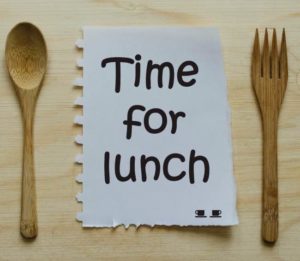
Learn the benefits of planning and eating lunch no matter how busy your day!
In part one of our discussion about the power of lunch we learned how skipping lunch can impact food choices, blood sugar levels, and make you feel subpar to your usual self! We’re here to give you even more reasons why lunch is so great, and to set you up for success when it comes time to make it happen!
Keep Your Smile!
If you’re a typical lunch skipper, you likely know that skipping lunch can make you moody and irritable. You keep losing your patience at work or with the kids, and it’s as if you have morphed into a different person. You just aren’t your typical, kind self. The next time this happens, ask yourself: “Did I have lunch?” Our bodies like rhythm and like being fed regularly to feel, think and act our best! Here are a few tricks to avoid the “hangry” syndrome and to remind yourself to get lunch in, even on the busiest of days:
- Set an alarm on your phone that goes off each day at a certain time to remind you to eat lunch at a normal hour.
- Add lunch into your calendar as a task for the day – treat it like a meeting you can’t miss and make it work with what you already have penciled in!
- Find a lunch partner so you can both keep each other in check! You’ll have the added bonus of someone to talk to and won’t have to eat alone.
- Make one day of the week a “lunch exchange” day with coworkers so you have to each prepare something to trade. Your taste buds will thank you!
Be Your Most Productive Self
Skipping meals can cause a decrease in productivity. Think of those nights that you’ve worked late and you don’t get enough sleep. You’re even more exhausted and less productive the next day. Skipping meals has that same effect – your mind becomes foggy and your productivity decreases. At the moment, it may seem that if you just push through and delay your meal you’ll get ahead. But are you really getting ahead with your health? You’re missing out on a great opportunity to get nutrient-packed foods with phytochemicals that can boost brain power. Our brains use approximately 20% of the energy we consume from our food throughout the day. (3) If we miss a meal, our brain is missing what it needs to help us be productive. Use lunch as a time to eat good foods and make your brain happy and productive by trying these new approaches:
- Make the time for a real lunch break and eat outside at least once a week. You’ll be able to appreciate the present moment and breathe the fresh air and relax. It’s a great reason to step away from your desk!
- Pair lunch-time with a 10-minute meditation. Designate lunchtime as your recharge time. You’ll be refreshed, fueled, and ready to get back to work.
- Get in touch with your hunger cues so you eat at regular intervals.
Keep That Furnace a’burning!
Skipping meals can lower metabolism and lead to weight gain. People tend to think if they skip a meal it means fewer calories consumed. In reality, the opposite is true. Weight gain may, in fact, occur because of the increased amount you are likely to eat when your body feels the hunger set in later in the day. Additionally, when your body shifts into starvation mode to conserve energy this also slows down your metabolism and skipping meals can impact your ability to exercise. In a study, researchers tracked how much participants ate at each meal and how much they exercised and found that those who skipped lunch or dinner the most spent less time exercising and burned fewer calories than those who didn’t skip meals often. (1)
- Go for a bigger lunch and a smaller dinner. Research shows that dieters might lose more weight if their main meal is lunch instead of dinner. In a study, those whose biggest meal was lunch lost 12.5 lbs at 3 months and those whose biggest meal was dinner lost 9.5 lbs. (4)
- Set cut-off times for breakfast and lunch so you can use them as checkpoints to make sure you’ve eaten!
- Wake up 15 minutes earlier so you have time to make something before the day gets busy.
If you’ve never been a 3-meal-a-day eater, it may seem daunting to follow a new structure. But remember – small changes now will become habits later. It just takes planning and effective goal-setting! The effort you put in will keep you on track at work, during exercise, when you’re out and about, and when you’re spending quality time with the family. Most of all, you’ll be on the right path for long-term health!
References:
- Carels, R. A., Young, K. M., Coit, C., Clayton, A. M., Spencer, A., & Wagner, M. (2008). Skipping meals and alcohol consumption. Appetite,51(3), 538-545. doi:10.1016/j.appet.2008.04.006
- Eric M. VanEpps, Julie S. Downs, and George Loewenstein (2016), “Advance Ordering for Healthier Eating? Field Experiments on the Relationship Between the Meal Order–Consumption Time Delay and Meal Content.” Journal of Marketing Research, June 2016, Vol. 53, No. 3, pp. 369-380.
- Jabr, F. (2012, July 18). Does Thinking Really Hard Burn More Calories? Retrieved from https://www.scientificamerican.com/article/thinking-hard-calories/
- Madjd, A., Taylor, M. A., Delavari, A., Malekzadeh, R., Macdonald, I. A., & Farshchi, H. R. (2016). Beneficial effect of high energy intake at lunch rather than dinner on weight loss in healthy obese women in a weight-loss program: A randomized clinical trial. The American Journal of Clinical Nutrition,104(4), 982-989. doi:10.3945/ajcn.116.134163



